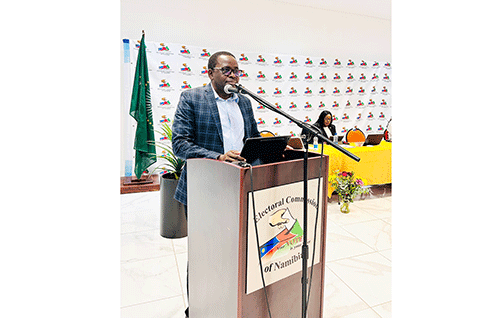Lahja Nashuuta
Namibians will head to the polls on 26 November 2025 to elect their regional councillors and local authority representatives, the Electoral Commission of Namibia (ECN) has announced.
Chief electoral and referenda officer Peter Shaama made the announcement during the launch of the regional and local authority electoral calendar in Windhoek on Tuesday.
He said vote-counting and the collation of results at the constituency level will be conducted from 26 to 29 November 2025.
Additionally, the final verification, collation and announcement of national election results is set for 30 November 2025.
The ECN election calendar outlines a comprehensive roadmap for what promises to be one of the most significant civic exercises in the country since the last general elections.
“The calendar serves as a roadmap guiding the Commission in executing and achieving targets of set electoral-related activities for any election,” Shaama told stakeholders at the launch.
The calendar states that the ECN will conduct a supplementary registration of voters (SRV) in August 2025, ahead of the election.
ECN chairperson Elsie Nghikembua said the SRV is intended to accommodate new voters who became eligible after the last general registration of voters (GRV) that ended on 1 August 2024.
“The purpose of this SRV is to register eligible voters who have turned 18 after the conclusion of the 2024 GRV,” Nghikembua said.
The SRV will be held from 4 August to 19 August 2025.
“This is because the upcoming elections are strictly constituency and local authority-based. Voters will need to cast their ballots in the constituencies or local authorities where they are registered,” he added.
Among the key dates includes the nomination of both independent candidates and political parties between 1 August and 31 October 2025.
Ballot preparation will already be underway.
The design, printing and delivery of ballot papers started on 16 June and will continue until 31 October.
The final verification of the sample ballots by political party representatives is scheduled for 23 October.
Sensitive election materials, including ballots and equipment, will be dispatched to various regions from 2 to 9 November, while duplicate voter registration cards will be issued between 17 and 23 November.
Special voting for election officials and police officers is set for 25 November 2025, a day before the official voting day.
Turnout
The ECN has expressed concern over the declining voter turnout in recent elections.
ECN commissioner Pius Iikwambi laid out the statistics, revealing that voter turnout has been on a downward trend since 1992, when it stood at 81.1%.
By 1998, turnout had dropped to 40%. Although there was a slight rebound in 2004 to 57.5%, voter participation has remained below 50% since 2010.
“In 2010, the turnout was 38.4%. In 2015, it declined further to 36.5%. In 2020, it was at 38.3%. Despite recent improvements, the figures are still below the national average,” Iikwambi noted.
He stressed that by-elections, in particular, have experienced alarmingly low participation rates.
For instance, Grootfontein recorded just 23.18%, Otjiwarongo 17.7% and Sesfontein 62%.
Lukas Muha, chairperson of the National Council, believes the solution lies in enhancing civic education.
“Voter and civic education is the foundation of an informed electorate. It is not enough to merely exercise our right to vote. We must understand the implications of our choices and processes that shape our governance,” he said.
Muha urged the ECN to intensify its voter education efforts, particularly targeting young and first-time voters.
“The Commission must equip citizens with the knowledge they need about their rights, the supplementary registration process, and how voting works,” he said.
– lnashuuta@nepc.com.na



